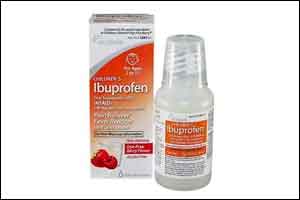- Home
- Editorial
- News
- Practice Guidelines
- Anesthesiology Guidelines
- Cancer Guidelines
- Cardiac Sciences Guidelines
- Critical Care Guidelines
- Dentistry Guidelines
- Dermatology Guidelines
- Diabetes and Endo Guidelines
- Diagnostics Guidelines
- ENT Guidelines
- Featured Practice Guidelines
- Gastroenterology Guidelines
- Geriatrics Guidelines
- Medicine Guidelines
- Nephrology Guidelines
- Neurosciences Guidelines
- Obs and Gynae Guidelines
- Ophthalmology Guidelines
- Orthopaedics Guidelines
- Paediatrics Guidelines
- Psychiatry Guidelines
- Pulmonology Guidelines
- Radiology Guidelines
- Surgery Guidelines
- Urology Guidelines
Ibuprofen better choice over oral morphine for pain relief in children after minor surgery

Widely available ibuprofen is a better choice for pain relief in children who have undergone minor orthopedic outpatient surgery, as it has fewer adverse effects compared with oral morphine, according to results from a clinical trial published in CMAJ (Canadian Medical Association Journal).
"This result suggests that adequate pain management should be an important goal of care, even after minor outpatient surgery, and that more effective pharmacologic and nonpharmacologic strategies should be explored," writes Dr. Naveen Poonai, Clinician Scientist, Lawson Health Research Institute, and Associate Professor, Emergency Medicine, Department of Paediatrics, Schulich School of Medicine & Dentistry, Western University, with coauthors.
The study included 154 children aged 5 to 17 years who underwent minor orthopedic surgery, such as keyhole surgery on joints, ligament and tendon repair, suture or hardware removal at London Health Sciences Centre in London, Ontario.
In the first 24 hours, more than 80% of the children in the study needed pain relief at home. Pain scores for children in both the oral morphine and ibuprofen groups were similar, but the children receiving oral morphine reported more adverse effects, such as nausea, vomiting, drowsiness, dizziness and constipation.
"Morphine did not provide superior analgesia, but was associated with significantly more adverse effects, making ibuprofen a better analgesic option," write the authors.
They note that as neither treatment completely relieved pain, more research is needed into effective pain relief, especially for more severe pain.
Oral morphine use at home has not been previously studied in children who have had minor surgery nor has it been compared with ibuprofen.

Disclaimer: This site is primarily intended for healthcare professionals. Any content/information on this website does not replace the advice of medical and/or health professionals and should not be construed as medical/diagnostic advice/endorsement or prescription. Use of this site is subject to our terms of use, privacy policy, advertisement policy. © 2020 Minerva Medical Treatment Pvt Ltd